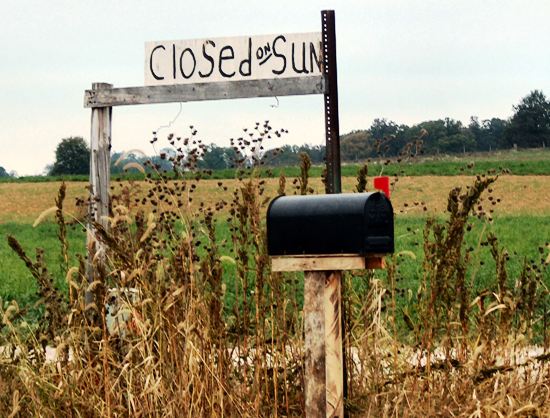‘Joining’ the Amish: Russell Maniaci and the Amish mission movement
Outsiders often express an interest in joining the Amish. The Amish traditionally do not seek out converts. In one example related by John Hostetler in Amish Society, a particularly zealous outsider–though never actually formally joining an Amish congregation–did much to stir up Amish circles in the 1950s. As Hostetler writes:
When outsiders join, or attempt to join, the Amish church, issues may arise that polarize the group. This occurred when a Detroit working-man was overjoyed in his discovery of the Amish people. While in a state of uncertainty about the adequacy of his religion, he read a newspaper account of Amish in Kansas who had sold their farms and moved away because oil was discovered on them. Maniaci concluded that”either these people were fools or their religion was real,” and in hopes that it was “real,” he wrote to one of the Amish farmers asking how he could join their group. He was referred to an Amish family in his own state of Michigan. But the Amish had no precedent for taking in outsiders and referred Maniaci and his family to a small Mennonite mission in Detroit, which they joined. Still aware that it was the Amish who had won him to Christ, Maniaci began to arouse the Amish to do missionary work. The Amish expression of the Christan life, he felt with deep sincerity, should be proclaimed far and wide. He began publishing an evangelistic news sheet, Amish Mission Endeavor, and to all Amish ordained persons sent specially prepared letters in which he said: “My only interest is to see the Amish Church on fire for the Gospel. What about the debt that you as a leader owe to the unsaved? There are many young people in your church who are willing to launch out…Will you lead them or will you cause them to join other churches?” Maniaci’s efforts brought some results, and he succeeded informing a “mission-minded” group in several states. The first of several Amish mission conferences was held in Kalona, Iowa, in 1950. Amish persons attended against the advice of their bishops.
Hostetler continues:
Maniaci was considered a dangerous innovator by Amish leaders. After all, he could not speak the language of the Amish and was regarded by them as an intruder. To offset this criticism from the leaders, his Amish sympathizers conducted the annual missionary conferences in German. Maniaci concluded that “they did not like an outsider running their affairs.” Nevertheless, with his pointed, mimeographed messages,he had helped to form a special interest group within Amish society and had put like-minded persons into communication with one another.
Amish are occasionally criticized for having an overly inward-looking focus. Amish tend to concentrate religious energies on their own,rather than seeking out new converts. Operating in a spirit of humility, Amish choose quiet witness over brash proclamation. Perhaps some of the inward focus also comes out of apprehension of cases like Maniaci’s. Being Amish is not predicated on being raised within Amish culture, but as Amish themselves say, it certainly helps. The skill sets are present and sense of identity ingrained for a person raised Amish, enabling him to more easily adapt to adult member life, much more so than for someone coming from a ‘modern’ orientation.
At the same time, while evangelism is largely off the table, there has been some interest among Amish in mission-oriented work, seen today in the support of some Amish for the activities of organizations such as the Mennonite Central Committee. As Steven Nolt adds in A History of the Amish on the Maniaci case, though Amish attempted to separate themselves from Maniaci’s mission movement, at the time there was a clear interest in church activity that “worked outside traditional church structures.” The result was the formation of a Mission Interests Committee which worked to orchestrate out-of-community work projects. Nolt points out that Amish mission supporters of the time often eventually went the way of full-scale shifts to Beachy Amish or Mennonite congregations,sometimes under the justification of the necessity of cars or college ministerial-prep study to being effective in mission activity. Nolt writes on the mission movement:
For Old Orders, it confirmed a suspicion that agitating for reform in one aspect of church life probably was linked to a wholesale embrace of modernity. Even the innocent interests of mission-movement supporters quickly produced automobile ownership and higher education. As a result, many Old Orders became more wary of outside religious influences that promised to solve Amish problems with new spiritual insights.






Interesting reading this the day before planned trip to Kalona!!
JOINING THE AMISH
I THOUGHT THE ARTICLE PLUS EVERYTHING ELSE IT REFERRED TO WAS EXCELLENT.
I HAVE OFTEN THOUGHT OF THE POSSIBILITY OF STAYING WITH AN AMISH FAMILY FOR A WHILE.
I TRULY LOVE THE AMISH AND HAVE READ MUCH ON THEM.
BLESSINGS TO ALL,
MAXILUV27@GMAIL.COM
JOAN SOUDERS
Thanks Jean–enjoy the trip!
Hello Erik; I’m in Indiana, hoping to visit my Amish pen friends in the next couple of days. Will be in touch soon.
As one Amish man wrote about this subject way back in 1993 in Small Farm Journal –
” If you admire our faith – strengthen yours. If you admire our sense of commitment – deepen yours. If you admire our community spirit – build your own. If you admire our simple life – cut yours back. If you admire our deep character and enduring values – live them yourself”
Living near the Amish
My wife and I agree with the quote from Small Farm Journal, and realize that we would most likely not be accepted into an Amish community because we have both been divorced and remarried.
We have tried to live in a similar manner, but have not found the support from any of the “English” communities we were near.
Our question is: How accepting are Amish communities of families that live like them, but are not part of their church?
Very apt in this case Tom. And Helen have a nice time and give a holler when you have a chance. I will be in Lancaster next month.
This is like the new person at work or someone who joins an organization and comes in and decides things should be done this way or that way. If they were brought in for that purpose then okay. If not, they usually aren’t around for very long.
Nice analogy Bill. Sounds like you might be familiar with the type.
Sort of like the American Indians? Outside influences will always eventually contaminate. “A little levan, levanth the whole lump” My reason for reading this, is my interest in joining them. My fear is my own motivation to change things I think can be done better. Guess you have to define, “better”.
i want to become amish and forget about all this im going thru right now….help!
mission movement
I know someone who was Amish, went to the mission conference in Kalona, then went to Eastern Mennonite College to get educated to be an overseas missionary (which she then was for decades). After she finished college, she did leave the Amish church and became Mennonite (though interestingly enough her Amish community did not remove her for going to college but she removed herself).
'jOINING THE AMISH'
THIS IS IN REFERENCE TO THE ARTICLE BY RUSSELL MANIACI & THE AMISH MISSION MOVEMENT.
I WOULD LIKE TO BE A GUEST ON AN AMISH FARM FOR AS LONG AS THEY WOULD LET ME AND MY DOG STAY.
I HAVE ALWAYS BEEN VERY INTERESTED IN THE AMISH, READ UP ON THEM AND BEEN TO AREAS WHERE THEY HAVE BEEN.
I LIKE THE PLAINNESS OF THEIR LIFESTYLE AS WELL.
THANKS,
MAXILUV27@GMAIL.COM
JOAN SOUDERS
add to my story
ps to the above: of course I would like to join the Amish, but learning about their ways more would come first. Please attach this to my above story.
Maxiluv27@gmail.com
Joan Souders